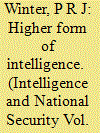|
|
|
Sort Order |
|
|
|
Items / Page
|
|
|
|
|
|
|
| Srl | Item |
| 1 |
ID:
080335


|
|
|
|
|
| Publication |
2007.
|
| Summary/Abstract |
Throughout his distinguished career, the historian Hugh Trevor-Roper was known in many incarnations and guises: the 'sleuth of Oxford'; Regius Professor of Modern History at Oxford; the Spectator's Mercurius Oxoniensis; Baron Dacre of Glanton; and Master of Peterhouse College. In addition, he was to gain wider notoriety in the early 1980s as the man who helped authenticate the forged Hitler Diaries. Nevertheless, his wartime embodiment as a British intelligence officer is one facet of his personal history that has never before been addressed by scholars in any great depth. Using previously unpublished material from Trevor-Roper's memoirs and personal papers, as well as excerpts from the Guy Liddell Diaries, this article aims to highlight the fact that, contrary to the impression engendered by F.H. Hinsley's dry and depersonalized multi-volume official history, British Intelligence in the Second World War, Major H.R. Trevor-Roper, and many other intelligence officers like him, not only had a 'good war', but a rich and colourful one. If historians are to escape the late Sir Maurice Oldfield's indictment of that official history, namely, that it was written 'by a committee, about committees, for a committee', they might do worse than begin to reappraise the role of the individual in the context of Britain's intelligence effort during 1939-45. The late Lord Dacre, so this article argues, is one such individual requiring further study.
|
|
|
|
|
|
|
|
|
|
|
|
|
|
|
|
| 2 |
ID:
075301


|
|
|
|
|
| Publication |
2006.
|
| Summary/Abstract |
During the Second World War Nazi Germany presented British intelligence with two intellectual challenges: to acquire its tactical‘secrets’ and to comprehend the strategic ‘mysteries’ of its commanding elite. The former were hidden, but knowable through the miracles of Ultra. The latter – Hitler's strategic intentions – were by contrast virtually impenetrable. Consequently, between 1940 and 1943 British intelligence used the talents of an astrologer, Louis de Wohl, who claimed – wrongly – that Hitler's strategic plans were astrologically inspired. However, as de Wohl's star began to wane he was talent-spotted by the Special Operations Executive (SOE), which employed him to disseminate black propaganda. He consequently travelled to the United States where, in tandem with British Security Co-ordination, he undermined American confidence in the invincibility of Hitler through astrological prognostications. This article aims to demonstrate that although Britain had unprecedented access to Germany's tactical ‘secrets’, the ‘mysteries’ of Hitler's strategic mind-set remained just that.
|
|
|
|
|
|
|
|
|
|
|
|
|
|
|
|
|
|
|
|
|